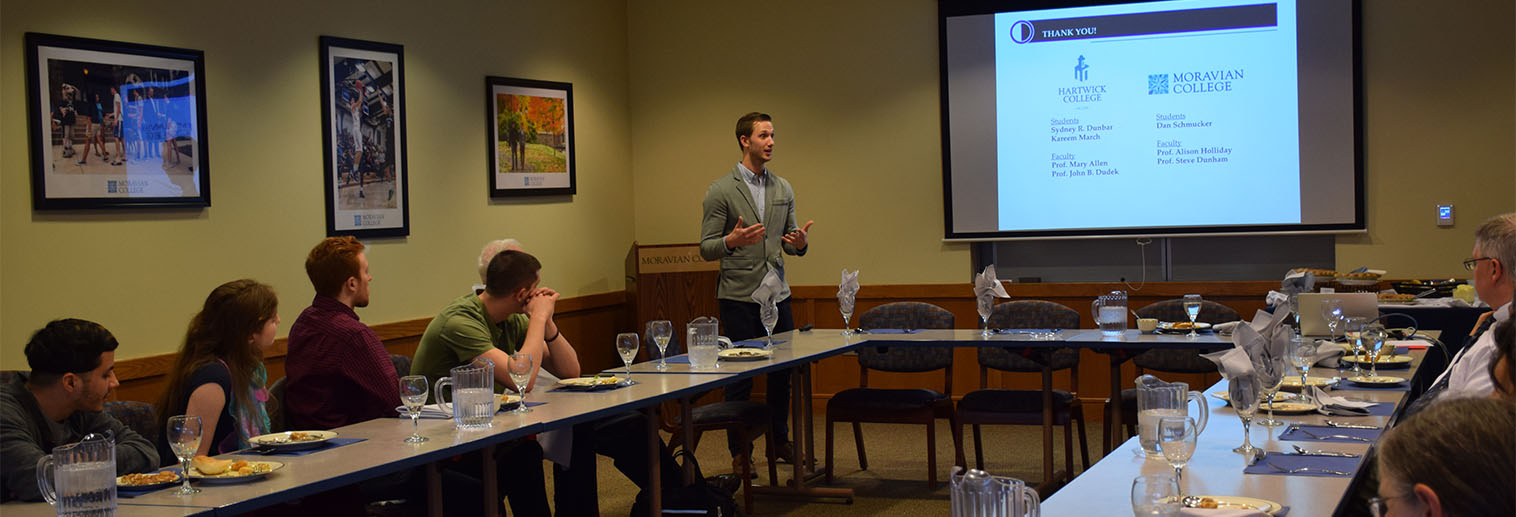The Teacher
Michael Bertucci, assistant professor of chemistry, delivers innovation in research and teaching.
What does a Friday night ice cream party have in common with the process of bacterial infection? No, this is not the first line of a joke. It is the analogy Michael Bertucci, assistant professor of chemistry, uses as he begins to explain the molecular signaling that occurs among bacteria as they gather forces in preparation to infect their host. Bacteria need a quorum before they can muster a successful invasion, explains Bertucci during a presentation of his research, “Manipulating Electronic Interactions to Degrade Signaling Molecules in Bacterial Communication,” at the February 25 faculty luncheon.
“So, if you think about getting friends together for a huge ice cream party, the phone is the vehicle of communication. Texts go around, and everyone shows up,” says Bertucci. “In the process of building a quorum, bacteria send out what are called signaling molecules—their version of text messages--to other bacteria, which brings them all together.”
With that, Bertucci’s audience of faculty members, from a range of disciplines--science, of course, but also history, philosophy, political science, sociology, religion, and mathematics--are on board and engaged in the heady science. It is no small feat, but with youthful exuberance, creativity, a little humor and a huge desire to communicate science effectively to his audience, Bertucci makes it look easy.
First an Educator
Bertucci majored in chemical biology as an undergrad at Stevens Institute of Technology. He had his sights set on medicine, but two light-bulb moments turned his head: He had an opportunity to do some teaching and was captivated by it. “I love getting up in front of a class and finding a way to teach a concept to students and seeing them get it,” he says. Bertucci also had to accept the fact that if he was going to feel ill every time he watched graphic medical procedures on “Grey’s Anatomy,” medicine might not be the best career path for him.
He went on to get his doctorate in organic chemistry at the University of North Carolina at Chapel Hill, taught a year at Hartwick College and joined the faculty here at Moravian University in fall of 2015 where he is in his teaching element--a liberal arts college with small class sizes, a diversity of ideas, and a learning philosophy that meshes with his own. “I have so much respect for the chemistry department and how intense the faculty is about finding the right way to communicate chemistry. They’ve revolutionized the way organic chemistry can be taught,” says Bertucci who confesses to using funny or surprising ways to convey a concept and help it stick with his students, such as comparing the reactivity of a large atom to a thousand-pound fat man. “If the atom takes on or gives away an electron, it’s hardly noticeable,” he explains.
But Bertucci doesn’t attribute that revolutionary approach only to his own department, he sees a campus-wide drive among faculty to find new ways to engage students, whether through technology, classroom setups, or mediation of group work, and he is grateful for colleagues with whom he can bounce ideas back and forth.
While many scientists would salivate over an opportunity to teach at a big research institute with lots of resources or to jump to a lucrative industry job, Bertucci is happy as a clam right here at Moravian University doing what he loves best. “I have both teaching and research interests, but at the end of the day if I were being evaluated heavily in one area or the other, I’d want it to be my teaching,” says Bertucci. “I would spend more time making sure my teaching is awesome than that my research is amazing.”
Next a Researcher
Of course, his research is amazing, too. Bertucci’s passion for organic chemistry stems, in part, from the puzzle of it, but where the magic happens is in discovering chemical ways to mitigate biology. “That’s where my research lies,” says Bertucci, “where I really get pumped.”
And the goal of his research into the bacterial ice cream party is to interrupt that party—prevent those bacteria from forming the quorum necessary for infection, which could be accomplished in any one of three ways: take away the cell phones of the signaling bacteria, interfere with the text messages, or smash the cell phones of the receiving bacteria. Bertucci and his student researcher Dan Schmucker ‘17 have been exploring the second pathway. They have created molecules that mimic the signaling molecules but with an electron structure that speeds up the degradation of those molecules to impede signaling, thwart quorum-building and prevent infection.
The end game is to develop new-age antibiotics that will slow the process of bacterial resistance. “The antibiotics we have today, work by killing bacteria, so there’s a lot of incentive for those bacteria to mutate into resistant forms,” explains Bertucci. “Messing with the signaling mechanism isn’t life-threatening. And while the bacteria may eventually catch on to the signaling impediment and find new ways around it, the timeline will be much longer than it is for traditional antibiotics.”
Looking ahead, Bertucci plans to write an application to the Student Opportunities for Academic Research (SOAR) for two biochemistry students to assist him this summer with research into a different type of signaling molecule—peptides or short proteins. The mention of it lights up his face because it’s research plus teaching, and for Bertucci, the chemistry in that combo is perfect.

